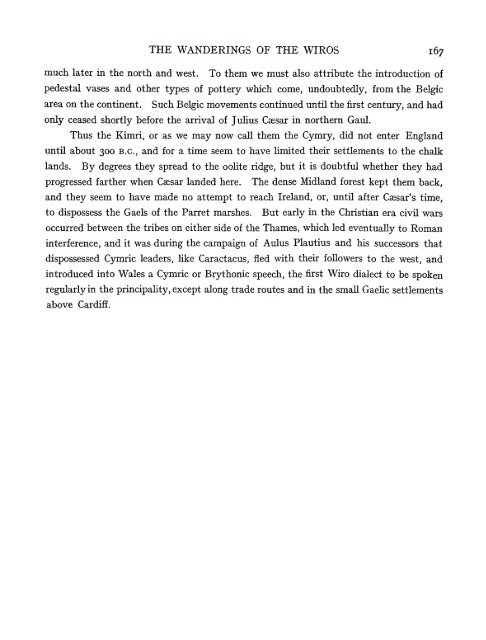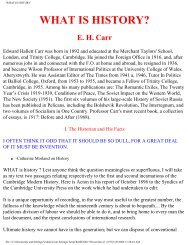The bronze age and the Celtic world - Universal History Library
The bronze age and the Celtic world - Universal History Library
The bronze age and the Celtic world - Universal History Library
Create successful ePaper yourself
Turn your PDF publications into a flip-book with our unique Google optimized e-Paper software.
THE WANDERINGS OF THE WIROS 167<br />
much later in <strong>the</strong> north <strong>and</strong> west. To <strong>the</strong>m we must also attribute <strong>the</strong> introduction of<br />
pedestal vases <strong>and</strong> o<strong>the</strong>r types of pottery which come, undoubtedly, from <strong>the</strong> Belgic<br />
area on <strong>the</strong> continent. Such Belgic movements continued until <strong>the</strong> first century, <strong>and</strong> had<br />
only ceased shortly before <strong>the</strong> arrival of Julius Caesar in nor<strong>the</strong>rn Gaul.<br />
Thus <strong>the</strong> Kimri, or as we may now call <strong>the</strong>m <strong>the</strong> Cymry, did not enter Engl<strong>and</strong><br />
until about 300 B.C., <strong>and</strong> for a time seem to have hmited <strong>the</strong>ir settlements to <strong>the</strong> chalk<br />
l<strong>and</strong>s. By degrees <strong>the</strong>y spread to <strong>the</strong> oohte ridge, but it is doubtful whe<strong>the</strong>r <strong>the</strong>y had<br />
progressed far<strong>the</strong>r when Caesar l<strong>and</strong>ed here. <strong>The</strong> dense Midl<strong>and</strong> forest kept <strong>the</strong>m back,<br />
<strong>and</strong> <strong>the</strong>y seem to have made no attempt to reach Irel<strong>and</strong>, or, until after Caesar's time,<br />
to dispossess <strong>the</strong> Gaels of <strong>the</strong> Parret marshes. But early in <strong>the</strong> Christian era civU wars<br />
occurred between <strong>the</strong> tribes on ei<strong>the</strong>r side of <strong>the</strong> Thames, which led eventually to Roman<br />
interference, <strong>and</strong> it was during <strong>the</strong> campaign of Aulus Plautius <strong>and</strong> his successors that<br />
dispossessed Cymric leaders, like Caractacus, fled with <strong>the</strong>ir followers to <strong>the</strong> west, <strong>and</strong><br />
introduced into Wales a Cjnnric or Brythonic speech, <strong>the</strong> first Wiro dialect to be spoken<br />
regularly in <strong>the</strong> principahty, except along trade routes <strong>and</strong> in <strong>the</strong> small Gaelic settlements<br />
above Cardiff.







